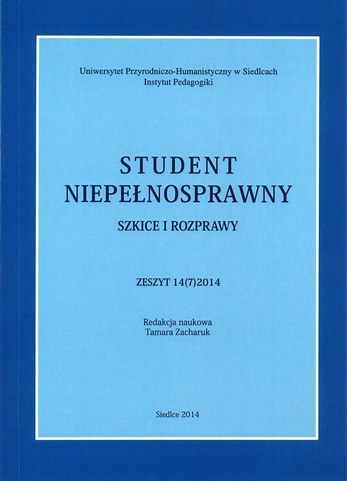Pedagogical aspects of preparing future teachers to work in inclusive educational environment
Keywords:
инклюзивное образование, дети с особыми образовательными потребностями, модель, моделирование, компоненты (нормативно-правовой, теоретико-методологический, мотивационно-целевой, содержательноинформационный, операционально-технологический, организационно планирующий, эмоционально-волевой, оценочно-рефлексивный, результативнокорректирующий), сопровождениеAbstract
The article high lights the theoretical and methodological aspects of the simulation training of future teachers to work in inclusive education , the essence of the modelis defined as the equivalent descriptions of real actions of the future teachers in inclusive education is a component of the model: the legal (statutory and legal acts of inclusion) theoretical and methodological (axiological, humanistic, systemic and other approaches), motivational target (motives, goals of inclusive activities ), content- information (inclusive excursions into the psychological and pedagogical disciplines , special courses for choice with the inclusive theme), operational and technology (skills, skills, competencies, technology in the field of inclusion), organizational planning (organization activities, planning the inclusion), emotional and volitional (creating emotional spirit, the implementation of willpower), appraisal and reflective (assessment, reflection results inclusiveof preparation), efficiently - adjustment (justification of the results inclusive of preparation, its correction).
Downloads
References
2. Бизяева, А.А. Психология думающего учителя: педагогическая рефлексия / А.А. Беляева. – Псков: ПГПИ им.С.М. Кирова, 2004. – 216 с.
3. Большой энциклопедический словарь. – 2-ое изд. перераб. и доп. – М.: Большая Российская энциклопедия; СПб.: Норинт, 2004.– 1456 с.
4. Государственная программа развития специального образования в Республике Беларусь на 2012–2016 годы // 6733[1] pdf (SECURTD). Дата доступа – 20.10.2013.
5. Захарук Тамара. Профессиональное образование в кругу включенного воспитания – анализ оценки учителей, исполняющих включенное воспитание в практике / Тамара Захарук, Катарзина МарсинякПапроска // Формиране на гражданина и профессионалиста в условията на университетското образованиесборникс научниав стати. Габрово: изд-во «ЕКС-ПРЕС», 2013. – Втора книга. Том втори. – С. 419– 429.
6. Змушко, А.М. Специальное образование в новом учебном году: факты и цифры // http://disright.org/ru/news/specialnoe-obrazovanie-vnovom-uchebnom-godu-fakty-i-cifry. Дата доступа – 18.10.2013.
7. Краевский, В.В. Методология педагогики: новый этап: учеб. пособие для студ. высш. учеб. заведений / В.В. Краевский, Е.В. Бережнова. – М.: Издательский центр «Академия», 2006. – 400 с.
8. Моделирование и познание / Ред. д-р филос. наук В.А. Штофф. [Предисл. Л.В. Уварова]. – Минск: Наука и техника, 1974. – 212 с.




